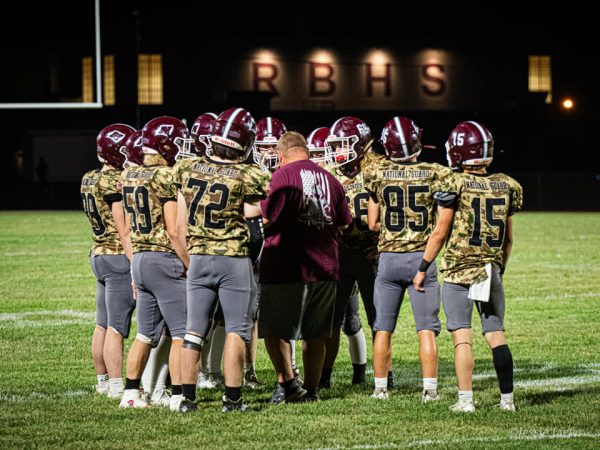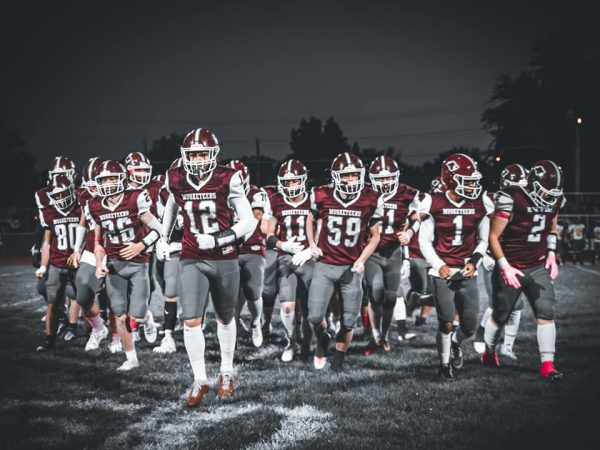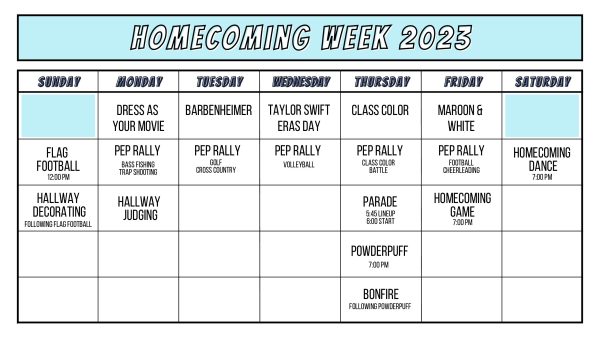22 Minutes With Mr. Guehne
Recently I sat down with our Principal Mr. Guenhe. We covered numerous topics such as the future of our school, pets, fantasy football, and even the widely discussed case of IXL. It was a great conversation.
Q1: When did you know you wanted to become an educator?
A1: When I was in early college probably, I had a few majors that I decided I didn’t want to pursue anymore. I had a good desk job as a college kid, just working on a computer all the time… My mom was a teacher, I had some really good teachers as a student and some really bad, and I honestly wondered how they kept their job, so I wanted to become a school administrator, that was my goal.
Q2: What College did you attend?
A2: I did my undergrad at SIUE and my masters degree is from Eastern
Q3: In the words of Mr. Tallman, “Red Bud is a great place to be.” What do you intend to do to keep Red Bud great
A3: I want to work on some things to help grow pride for you guys (students) in your school, and make this a place where see that what they do on a daily basis, whether it is English or math class or the way they treat their peers in the hallway, that those things matter. Help grow a sense of community and school spirit… and we’re putting some things in place to incentivize those things.
Q4: Were you familiar with Coach Walter before he was hired at Red Bud?
A4: Coach Walter was hired after my first year at Waterloo, so he was a teacher and basketball coach for 5 of my 6 years there… I was always impressed by his positivity and his ability to connect with athletes… I am excited to see him bring that kind of attitude to Red Bud and see what he can do with it.
Q5: Do you have any pets?
A5: I have a cat and two dogs. We don’t have any kids, so those are our kids.
Q6: Are there any positives that came from COVID
A6: I do, I think we displayed and grew a lot of resiliency, both students and adults, we really figured out that we could handle more than we thought, that we were maybe tougher than we thought. I think we got tougher because of the trials we had to go through. I also think that it made you guys (students) appreciate school more.
Q7: Do you play Fantasy Football? How is the team?
A7: I’m a huge fantasy football nut. Draft day is like Christmas for me, it’s better than a birthday, it’s better than the first day of summer vacation… I look forward to it for literally a year, I am in three leagues. I’m in one league, it’s our 19th year, mostly the same guys, most of us went to high school together. It’s a 10 man league, keeps two players every year, we have a trophy that you travel with that gets your name on the plaque, we have a podcast that goes with it. Basically, since I was 18 years old we’ve had this league going with the same core group of guys. I am doing alright… I’m in playoff position
Q8: Who is your fantasy team all-star?
A8: I’ve got two guys that I count on, Alvin Kamara and Johnathan Taylor.
Q9: What brought IXL to your attention?
A9: The goal is that if people take IXL seriously, it should increase performance in their math and English classes, so better grades in math and English, and boost our SAT scores in the long run. This is a good school, we’ve got kids that get good grades, teachers that work really really hard, we’ve got kids that work really really hard. But, if you look at how we’re performing state-wide on the SAT… we’re not doing so hot.
Q10: How long do you anticipate doing IXl?
A10: At least for a few years, we won’t see results overnight. If we find it has no value, we can pivot to something else.
Q11: Has the idea for an incentive been proposed for motivation to push themselves more in IXL?
A11: WE have had some conversations about that. Some of the leading Jr. and Sr. students are going out to the community to ask for gift cards, to help us be able to provide those incentives. Another thing we are going to do next year, this year’s juniors are seniors, those that meet standards on the SAT will be able to leave before advisory.
Q12: In what ways do you believe IXl translates into success on the SAT and ACT?
A12: It is geared for that… They have data to back up an increase in those scores.
Q13: What would you say to a student who says their IXL scores don’t represent their true abilities?
A13: I would say prove it. Do that diagnostic and prove that that score is inaccurate. We have a lot of scores that are outliers. There may be some students whose scores really don’t represent their ability, but there are some students who take a great deal of pride that they’re doing third-grade work… and they think that is funny or amusing or something to laugh about and be proud of, and I would say it’s not.
Q14: Do you believe that students who are trying could be disheartened by their IXL scores and may shy away from the SAT and or ACT
A14: That is certainly possible and not unreasonable… I would say to anybody who is discouraged by anything, whether is it a number on an IXL score, or a grade on an essay, or a performance in a sporting event, your life is going to be defined by adversity and events that you don’t like and the way you respond to those is going to determine how your life goes. I would encourage those people to be resilient, think about why this score is the way it is and how can I get it to be where I want it to be.
Q15: What would you say to students who haven’t put forth their best effort on IXL?
A15: the same thing I would say to people who don’t put forth their best effort in school. That is why? You have to go to school anyways, you can either sit around and be lazy and waste 8 hours and get nothing out of it, or you can grow, you can learn, and you can become a better person.
Q16: I recently discovered Movember. Can you describe Movember and what it does for others?
A16: Movember is an organization that raises money to increase money for men’s health issues. It raises funds to both advertise and funds research projects. I signed up through the Movember organization to raise money for these mental health initiatives, and they donate money to mental health programs, research on prostate cancer, testicular cancer, suicide prevention, and things like that. I have a friend who has been doing fundraising with Movember for the last few years… I think it is very important that we talk about things related to men’s health, especially mental health issues, depression suicide, things like that, because there is this sort of expectation that “I’m a man, I’m tough, I don’t get sad, I don’t have problems, I don’t have emotions” and I think that is wrong, I think that is unfair. I’ll be candid, I have struggled with depression, I have been through counseling, I have been on antidepressants, I’m not anymore, but that’s because I did the things I needed to. I sought out counseling, got on medicine, and built the resources within myself I needed to be aware of working through my depression. But that was hard for me to do because it felt weak to need to talk to somebody. It felt weak to talk to a counselor. It felt weak to talk to my doctor. It felt weak to finally admit, I can’t do this myself. It felt this way because that is what society has told us historically, and I don’t think that’s fair. Men’s health issues, that Movember tries to bring attention to, particularly from the mental health side, are sort of personal for me and I‘ve been around several young men, as an educator who has ended up taking their own lives and they weren’t people you wouldn’t expect to do that… from the outside looking in, you wouldn’t have thought there were any problems… That mental health piece really matters to me.










